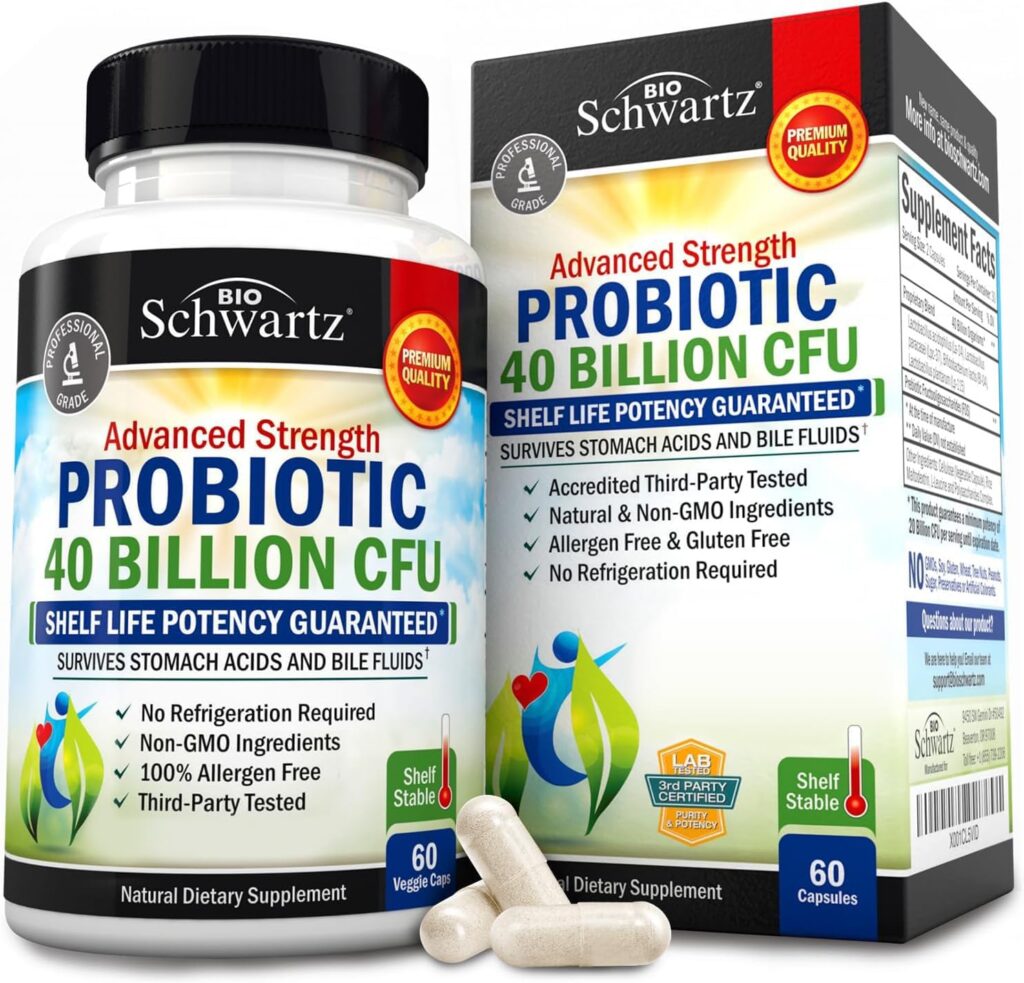When it comes to supporting your health, you’ve probably heard about probiotics—those tiny, friendly bacteria that promise big health benefits, from improved digestion to a stronger immune system. But if you’ve ever stood in the supplement aisle or scrolled through online reviews, you might know how challenging it can be to choose the right probiotic for you. With countless options available, how do you make sure you’re getting a high-quality product that’s truly worth your time and money?

>>>Visit Amazon to get your bottle of BioSchwartz Advanced Strength Probiotic<<<
This guide is designed to help you make sense of the probiotic landscape, giving you the tools to choose a high-quality supplement that meets your needs. By the end of this, you’ll feel confident in knowing what makes a probiotic effective and which products are popular for their quality and user satisfaction.
This post contains affiliate links. If you make a purchase through these links, I may earn a commission at no additional cost to you. I only recommend products and services I trust.
Understand What Probiotics Are and What They Do
Before you buy a probiotic, it’s important to understand what probiotics are and why they’re beneficial. Probiotics are live microorganisms—mostly bacteria and yeast—that live in your gut. They help maintain a balance of healthy bacteria, assist in digestion, and support your immune system. Think of probiotics as your gut’s personal army, fighting off harmful pathogens and keeping your digestive tract running smoothly.
High-quality probiotics can make a difference in managing gastrointestinal issues, improving mood, and even supporting skin health. However, it’s not just about picking up any bottle labeled “probiotic”—you need to know what to look for to get the most out of your supplement.
Look for Multiple Strains
One of the most important things to consider when selecting a probiotic is the variety of bacterial strains. Different strains serve different purposes—some are great for gut health, while others focus on immunity or skin health. Generally, high-quality probiotics contain multiple strains to provide a broader range of benefits.
- Lactobacillus and Bifidobacterium are the most commonly used strains and are known to be beneficial for digestion and immune support.
- Saccharomyces boulardii, a yeast strain, is also a popular probiotic known for preventing diarrhea and helping balance gut flora.
A good example of a highly-rated probiotic that features multiple strains is Garden of Life Dr. Formulated Probiotics. Available on Amazon, this product contains 16 different strains, including Lactobacillus acidophilus and Bifidobacterium lactis, providing a well-rounded approach to gut health. With thousands of positive reviews, it’s a great place to start if you’re seeking a quality multi-strain probiotic.
Pay Attention to CFU Count
CFU, or Colony Forming Units, refers to the number of live and active bacteria in each dose of your probiotic. When it comes to CFU count, more isn’t always better, but you do want to make sure you’re getting enough to make an impact. For general health, a probiotic supplement with 10-50 billion CFUs is typically sufficient.
If you’re targeting specific health concerns, like Irritable Bowel Syndrome (IBS) or recurring yeast infections, you may want to look for products that contain higher CFU counts. A good option is Renew Life Ultimate Flora Probiotic, which has 50 billion CFUs and features 12 strains. It’s available on Amazon and is praised for its effectiveness in supporting digestive and immune health.
Check for Shelf Stability
Some probiotics need refrigeration, while others are shelf-stable. Shelf-stable probiotics are easier to manage and are usually more convenient for everyday use or travel. Just be sure to check the packaging to see whether your probiotic requires refrigeration or if it’s stable at room temperature. Refrigerated probiotics can lose their potency if not stored correctly, so be mindful of storage requirements.
One great shelf-stable probiotic is Culturelle Daily Probiotic. This popular product contains Lactobacillus rhamnosus GG, a strain known for its ability to survive stomach acid and provide digestive support. Since it doesn’t need refrigeration, it’s easy to carry with you wherever you go.
Choose a Probiotic with Targeted Benefits
Your needs will ultimately determine the right probiotic for you. Here’s a quick overview of which strains to look for based on specific health goals:
- Digestive Health: Look for probiotics containing Lactobacillus acidophilus and Bifidobacterium lactis.
- Immune Support: Probiotics with Lactobacillus casei or Lactobacillus rhamnosus can help enhance immunity.
- Women’s Health: If you’re focused on supporting vaginal health or managing yeast infections, choose a probiotic with Lactobacillus reuteri and Lactobacillus rhamnosus. Garden of Life Women’s Probiotic is a popular choice on Amazon for its targeted benefits for women.
Check the Packaging for Proper Protection
Since probiotics are living organisms, they need the right environment to survive. Make sure the probiotic you choose has protective packaging to ensure the bacteria survive until they reach your gut. Look for features like blister packs or dark, opaque bottles that shield the probiotics from light, heat, and moisture.
For instance, Align Probiotic, available on Amazon, uses specially designed packaging to keep its probiotics safe from harmful environmental factors, ensuring you get the full potency in every capsule.
Consider Prebiotics
Probiotics can be more effective when paired with prebiotics, which are non-digestible fibers that feed the beneficial bacteria in your gut. Some probiotic supplements come with prebiotics included, which can enhance the effectiveness of the probiotics.
A great example of a probiotic-prebiotic combination is Physician’s Choice Probiotics 60 Billion CFU. This product contains several probiotic strains and includes organic prebiotics to help nourish the healthy bacteria in your gut. With high ratings and many satisfied customers, it’s a popular choice for those looking for a comprehensive gut health solution.
Make Sure the Strains Are Clinically Studied
Another important factor when choosing a probiotic is whether the strains used have been clinically studied. It’s not enough to have a long list of bacteria—those strains should also be proven to be effective for the purpose you need them. Look for products that mention specific clinical studies or list patented strains.
Florastor Daily Probiotic Supplement is one of the few probiotics that features Saccharomyces boulardii lyo, a strain that has been extensively researched for its benefits on gut health. This product is widely available, including on Amazon, and has been used to treat various digestive issues with promising results.
Avoid Unnecessary Additives
When choosing a probiotic, it’s best to avoid products that contain artificial colors, preservatives, or unnecessary fillers. A high-quality probiotic should have as few additives as possible. Check the ingredient list and opt for products that focus solely on the active strains and necessary ingredients like the capsule.
For a clean, additive-free option, Hyperbiotics PRO-15 is an excellent choice. It contains 15 strains, is free from gluten and artificial ingredients, and uses a patented delivery system to ensure the probiotics survive their journey through your stomach acid.
Read User Reviews
Finally, one of the best ways to gauge the quality of a probiotic is by reading user reviews. Amazon is a great place to do this since it’s filled with customer experiences. Look for products that have thousands of positive reviews, and pay attention to what users are saying about the benefits they’ve experienced and any potential side effects.
BioSchwartz Advanced Strength Probiotic is highly rated on Amazon and boasts thousands of positive reviews. Users report improvements in digestion, reduced bloating, and overall enhanced gut health—making it a reliable option for many.
Check for Allergen Information
If you have specific dietary restrictions or allergies, it’s critical to choose a probiotic that fits your needs. Many probiotics are dairy-free, gluten-free, and soy-free, but not all of them. Make sure to read the label carefully to avoid any allergens.
Ora Organic Vegan Probiotics is a good option for those with dietary restrictions. It’s vegan, dairy-free, gluten-free, and contains strains specifically chosen for their digestive benefits.
Consult Your Healthcare Provider
Although probiotics are generally safe, it’s a good idea to talk to your healthcare provider before adding a new supplement to your routine, especially if you have any underlying health conditions or are taking other medications. Your doctor can help you choose the right product and determine the right dosage for your needs.
Choosing the Best Probiotic for You
Choosing a high-quality probiotic can feel overwhelming, but with the right information, you can make an informed decision that benefits your health. Remember to look for multiple strains, a sufficient CFU count, and targeted benefits based on your needs. Choose a product with protective packaging and avoid unnecessary additives. When in doubt, read user reviews and consult your healthcare provider.
If you’re ready to start your journey to better gut health, consider beginning with one of the highly-rated probiotics mentioned in this article—such as Garden of Life Dr. Formulated Probiotics, Renew Life Ultimate Flora Probiotic, or Align Probiotic. Each of these options has thousands of happy customers and provides a broad range of benefits to help support your digestive and immune health.
Your gut will thank you!
>>>Check out the price of BioSchwartz Advanced Strength Probiotic on Amazon<<<


